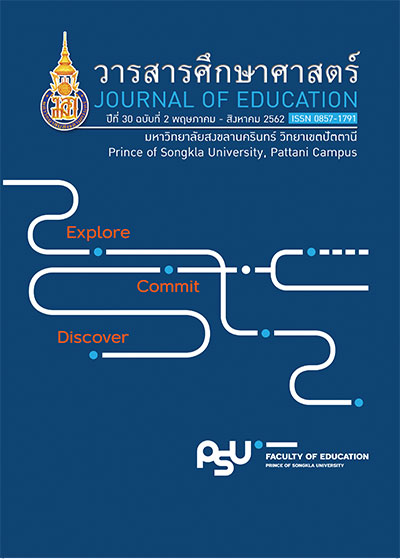Developing the Skill of Reflective Practice for EFL Teaching through Cognitive Coaching : A Case Study of the Pre-Service Teachers of English Education Program, Loei Rajabhat University
Main Article Content
Abstract
The objectives of this qualitative research were to study the pre-service teachers’ skill of reflective practice on teaching English before and after participating in the cognitive coaching process. Purposive sampling was applied to obtain 3 pre-service teachers with similar experiences in EFL teaching. They had no prior experiences on cognitive coaching process and reflective practice. The instruments included a self-assessment questionnaire, an observation form, and a semi - structured interview form. The data were collected in 2 phases: before and after cognitive coaching process. The cognitive coaching process included 4 steps: planning - group discussion on learning activities before implementation, interactive - implementation of learning activities in classrooms, reflective - group discussion and self-assessment through reflective practice on their own teaching performance, and application - using the knowledge learned to improve the teaching performances.
The findings were: 1) before the cognitive coaching process, the pre-service teachers showed the skill of reflective practice on action in 2 aspects: a quasi-reflective thinking which involved analyzing problems by using reasons and evidence with adoption instead of adaptation of theoretical knowledge, and a reflective thinking which involved changing the teaching and the problem solving strategies when they were not applicable. However, they still had a strong belief in theo- retical concept. 2) During the cognitive coaching process, it was found that the pre - service teachers’ state of mind had changed: their consciousness of what they were doing, what the problems were, and how to solve the problems was promoted; their efficacy, flexibility, and craftsmanship on EFL teaching were also shown with open-minded perception of others’ opinions. A concept and a practice of exchanging learning and teaching experiences as the start of the professional learning community were formed. 3) After cognitive coaching process, the skill of reflective practice in the 3 pre-service teachers was developed as they focused more on a contextual basis. They indicated that there was no fixed pattern of learning management; it varied according to the context and the factors; the theoretical knowledge was a guideline for a more appropriate alternative teaching/problem solving strategy. Learning through the experiences shared among peers and cognitive coaching by a more experienced person helped promoting their skill of reflective practice for solving problems and designing an appropriate EFL learning management more contextually.


